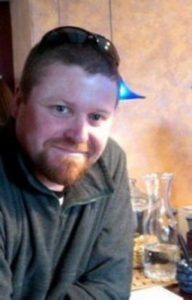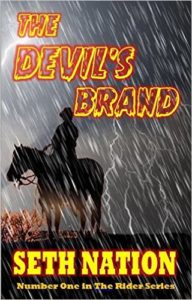 One of the biggest Western names of today is Seth Nation. Seth is the talent behind “The Devil’s Brand.” For those of you who already know the book– you know it’s one of the fastest selling Westerns of the year for a reason. For those of you who haven’t discovered it– what’s wrong? Did you lose your taste for Westerns? Don’t worry about anything other than getting yourself on your horse and over to Amazon. There’s a book there you now need to read. Do it now!
One of the biggest Western names of today is Seth Nation. Seth is the talent behind “The Devil’s Brand.” For those of you who already know the book– you know it’s one of the fastest selling Westerns of the year for a reason. For those of you who haven’t discovered it– what’s wrong? Did you lose your taste for Westerns? Don’t worry about anything other than getting yourself on your horse and over to Amazon. There’s a book there you now need to read. Do it now!
What drove you to start writing Westerns?
When I first started writing, I had this big epic fantasy novel in my head and aspirations of becoming the next J.R.R. Tolkien. I would have frequent periods of writer’s block and soon realized that I was having trouble because I wasn’t comfortable, I wasn’t invested. I decided to write what I loved to read, which was Westerns. I immediately noticed the difference. I think Westerns are important because, in a way, it is a process for us to connect back with our family’s past.
Where did you get the ideas behind “The Devil’s Brand?”
I wrote the scene where the Rider is near death escaping his followers with the intention of turning it into something—I didn’t know what—years ago. Over time and trial and error, I would create other scenes to see if they would connect. The backstory of Ethan came through this process until after a while I had what I needed. I think throughout all of this I got to know my character. There is quite a bit that I have written that I didn’t include in this book—that will appear in the follow ups. Living in Lawrence, Kansas, I knew from the start I wanted to include the Border War and “Bloody Kansas” as the backdrop to the story. My stepfather gave me the idea of the “man of remittance,” who turned into Oliver Kingston Dukes.
How long did it take you to develop “The Devil’s Brand?”
All told, I have been writing bits and pieces for nearly two years. In late 2015, I connected the dots and finished the novel in February. After a month of editing, I sent it to Outlaws for publication. The next ones will go easier because most of it is mapped out and partially written. I’m excited about book two because there will be a great train sequence that so far has been a blast to write.
How closely does the Western mirror the American way of life?
I believe they are one and the same. The American West was a time of great freedoms for many, think of Manifest Destiny and the call for a people to settle the West. For many, it held infinite possibilities, the American Dream, which in different ways is still alive today.
Which parts of Western philosophy do you personally try to add to your everyday life?
More than anything, I try to show great respect for those in my family who came before me. Their hard work and sacrifices granted me the life I have today. I have a deep appreciation and love for my family. I believe if you want something or want to achieve something, you put in the work and go get it. My dad and stepmother own a ranch in Oklahoma that is on land once owned by great-great-grandfather. They do a great job of passing on that heritage. My uncle on my mother’s side has done a ton of research on that side of the family. Thankfully, because of this, I have grown up with a huge sense of who I am and where I came from.
What are your favorite Western movies?
I love anything John Wayne is in. Growing up, he was my father’s hero, and we spent many weekend mornings watching them. I really liked Red River, Rio Bravo, and The Searchers to name a few. However, the biggest impact on me was the novel Lonesome Dove, which was turned into a pretty good movie as well.
What was your first experience of John Wayne?
Probably watching a movie with my dad or seeing the memorabilia my dad collected—he was a huge fan, and if John Wayne was on TV we watched it. As a kid, I enjoyed the films but not nearly as much as I do today. They say you turn into your parents. For me that is definitely the case. My dad gave me a love of Westerns and my mom gave me a good sense of music. I thank them both for it. They are my right side and left side. They keep me balanced.
How did those movies influence the way you write?
With Lonesome Dove, it was the realization of how well crafted and thought out characters could drive a story. To me, Woodrow Call and Augustus McCrae are two of the greatest literary characters of all time. The dynamic of their friendship is something I strive to insert into my characters. I grew up being blessed with lifelong friends. I think in my stories there will always be that element present. Even if a character is a quintessential “loner,” they will always need that someone. In The Devil’s Brand, Ethan Brody is that way. As much as he wants to be alone, he knows he needs that comradery be it in his younger years with Harland Poe or later on with Oliver Kingston Dukes.
Would you ever write a book about the Alamo or other historical events?
Definitely. The Oklahoma Land Rush is one. Many of my family come from Oklahoma so it is a familiar subject. I love the concept of Manifest Destiny and the settlers moving west. I also would like to write about historical figures. I had a novel idea about Butch and Sundance secretly faking their deaths and living out their years unknown until the 1950’s, only to reunite for one last heist, “The heist of all time,” to reveal their identities and go out guns blazing.
Do you believe in good and bad? Is that a concept that all who write westerns should keep in mind?
I think in any traditional Western you will have that. A reader always wants someone to hate and someone to root for. I always liked the stories where there characters were flawed and had both good and bad in them. I like the idea of redemption.
Who is the greatest American folk hero from the West—in your opinion and why?
Hands down, it is Lewis and Clark. They started it all. They took on one of the greatest adventures of all time, and in the process not only opened a nation for settling, but put forth that mindset that anything is possible.
What will your next book be about?
There will be at least one if not two more books featuring Ethan Brody and continuing the storyline from The Devil’s Brand and his pursuit of Gideon Pratt. I also have started a series of serial short stories that will feature two repeating characters.
Do you think it’s important to have a large publisher as a Western author?
Not necessarily. I think what is important is that an author finds a publisher who believes in them and the stories they want to tell. For me, I found that in Outlaws Publishing and JC Hulsey, and I couldn’t be happier.
Are you ever surprised by how many Western readers there are in the world?
No, Westerns are the stories of us, Americans, who we are and where we came from. There will always be an audience for that. Western readers are passionate about their genre, and It makes me proud that so far they are enjoying my story.
Would you ever write a non-Western?
Absolutely. Besides that itch to become the next Tolkien, I actually have a novel which is kind of a “Stand By Me” for the 80’s generation. It is about one-third complete and really reflects the adventures I had with the people I grew up with. Lifelong friends who helped make me who I am today.
How many Westerns have you written?
The Devil’s Brand is my first, and hopefully there will be many, many to come after that.
How have reviewers treated your books?
The reviews have been great. So far after six weeks, there are a few, but the book continues to hold a five-star rating. Although I really enjoy feedback, what folks liked and disliked, I think it helps hone your skills.
Do you have anything in the can that you haven’t released—and will this material ever see the light of day?
Baseball is one of my biggest passions, and one day I will write a baseball book, more than likely something about the Negri Leagues of the thirties. I have the story mapped out, just needs to be written. It will be a great story of intolerance and redemption. I also would like to write a solo novel about Oliver Kingston Dukes, a character in The Devil’s Brand, and dig into some of his adventures that I touch on in the book.
If you could travel back to the West and be a cowboy—would you?
Hell, yeah, if nothing more than just to see if I could keep up with my ancestors. Put in the hard day’s work like they did. Drive a herd of cattle, mix it up in some hole in the wall saloon, play cards with Doc Holiday, maybe get into some trouble with Billy the Kid. That is what is great about Westerns—the possibilities are endless.
Winter 1865: Five confederate deserters, near starvation and manic with fury over the state of the war go on a bloody rampage along the Kansas-Missouri Border taking retribution on a family of abolitionists they find harboring runaway slaves.
In the aftermath, Ethan Brody returns from the war to find everything he knows and loves reduced to nothing but ashes. Hell bent on revenge he sets off to find the murderous gang only to have them slip away. Losing his faith, he sets off on a life of bounty hunting, vowing to never again let justice go astray, “Alive” is no longer an option and in the process the legend of the Rider is born.
1894: Oliver Kingston Dukes a man of remittance finds his way to the town of Adobe Wells immediately becoming embroiled in the town’s struggle with the wealthy and powerful Katy brothers. Enter the Rider, on the trail of the notorious bandit Hector Salazar, he joins Dukes and the townsfolk to take back the town once and for all and perhaps… take back his own salvation. Download your copy of this great new Western here.


1 comment
I really enjoyed this interview. It was comprehensive and shared important thoughts of the author and his motivations. I look forward to the continuing saga of Ethan Brody, as well as the side story about Oliver Kingston Dukes.